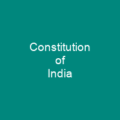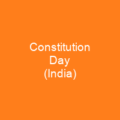Bhimrao Ramji Ambedkkar was an Indian scholar, jurist, economist, politician and social reformer. He inspired the Dalit Buddhist movement and campaigned against social discrimination towards the untouchables. He was independent India’s first Minister of Law and Justice, the chief architect of the Constitution of India, and a founding father of the Republic of India. He converted to Buddhism, initiating mass conversions of Dalits.
About B. R. Ambedkar in brief
 Bhimrao Ramji Ambedkar was an Indian scholar, jurist, economist, politician and social reformer. He inspired the Dalit Buddhist movement and campaigned against social discrimination towards the untouchables. He was independent India’s first Minister of Law and Justice, the chief architect of the Constitution of India, and a founding father of the Republic of India. He converted to Buddhism, initiating mass conversions of Dalits. In 1990, the Bharat Ratna, India’s highest civilian award, was posthumously conferred upon Ambedkhar. Ambedkar was born on 14 April 1891 in the town and military cantonment of Mhow in the Central Provinces. His family was of Marathi background from the town of Ambadawe in Ratnagiri district of modern-day Maharashtra. His ancestors had long worked for the army of the British East India Company, and his father served in the British Indian Army at the Mhow cantonments. In 1907, he passed his matriculation examination and in the following year he entered Elphinstone College, which was affiliated to the University of Bombay. In 1912, he obtained his degree in economics and political science from Bombay University. In his early career, he was an economist, professor, and lawyer. His later life was marked by his political activities; he became involved in campaigning and negotiations for India’s independence, publishing journals, advocating political rights and social freedom for Dalits, and contributing significantly to the establishment of the state of India .
Bhimrao Ramji Ambedkar was an Indian scholar, jurist, economist, politician and social reformer. He inspired the Dalit Buddhist movement and campaigned against social discrimination towards the untouchables. He was independent India’s first Minister of Law and Justice, the chief architect of the Constitution of India, and a founding father of the Republic of India. He converted to Buddhism, initiating mass conversions of Dalits. In 1990, the Bharat Ratna, India’s highest civilian award, was posthumously conferred upon Ambedkhar. Ambedkar was born on 14 April 1891 in the town and military cantonment of Mhow in the Central Provinces. His family was of Marathi background from the town of Ambadawe in Ratnagiri district of modern-day Maharashtra. His ancestors had long worked for the army of the British East India Company, and his father served in the British Indian Army at the Mhow cantonments. In 1907, he passed his matriculation examination and in the following year he entered Elphinstone College, which was affiliated to the University of Bombay. In 1912, he obtained his degree in economics and political science from Bombay University. In his early career, he was an economist, professor, and lawyer. His later life was marked by his political activities; he became involved in campaigning and negotiations for India’s independence, publishing journals, advocating political rights and social freedom for Dalits, and contributing significantly to the establishment of the state of India .
In 1956, when he was about 15 years old, his marriage to a nine-year-old girl, Ramabai, was arranged. His original surname was Sakpal but his father registered his name asAmbadawekar in school, meaning he comes from his native village ‘Ambadwe’ in RatNagiri. In 1897, Ambedkkar’s family moved to Mumbai where he became the only untouchable enrolled at ElphInstone High School. In 1906, he became, according to him, the first from his caste to do so do so he passed the fourth standard examinations. His wife had just moved to Baroda to work with the state government when he started to work for his family. He described the situation later in his writings as \”No peon, No Water\”. He was required to sit on a gunny sack which he had to take home with him. When they needed to drink water, someone from a higher caste had to pour that water from a height as they were not allowed to touch either the water or the vessel that contained it. He said that he considered education to be an occasion compared to the other state of education in other communities, and it was at this occasion that he was presented with a biography of the Buddha by Dadauskar Keluskar, the author and author of the biography of Dadausakar. He died in 1955.
You want to know more about B. R. Ambedkar?
This page is based on the article B. R. Ambedkar published in Wikipedia (as of Dec. 14, 2020) and was automatically summarized using artificial intelligence.







